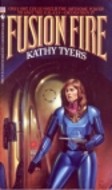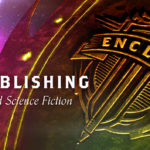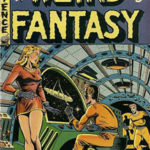Critiquing Critics Of Christian Fiction, Part 2
Subtitle: Christian novel “preachiness” may be greatly exaggerated.
Last week’s column had questions for critics who say Christian fiction isn’t as violent, realistic, creative, (presumably) sexy or Edgy™ [citation needed] as it should be.
This sequel addresses a related accusation: Christian fiction is too preachy.
 As with the previous common criticisms, I’ve often uttered this one myself. I’ve read some Christian books that I would call preachy, and not in a good way. Yes, some Christians seem to think a writing ministry is only God-honoring if they include the whole Gospel call in the novel someplace — regardless of whether the story is based on direct redemption themes.
As with the previous common criticisms, I’ve often uttered this one myself. I’ve read some Christian books that I would call preachy, and not in a good way. Yes, some Christians seem to think a writing ministry is only God-honoring if they include the whole Gospel call in the novel someplace — regardless of whether the story is based on direct redemption themes.
This may result from confusions over vocation more than anything else, as if direct Scripture quoting with calls for repentance and faith (as vital as that is!) is the only way to glorify God.
At the top of Speculative Faith is a rotating quote from Phillip Graham Ryken (from his book Art for God’s Sake). “The way in which a Christian who makes cars glorifies God is not by painting ‘John 3:16’ on the hood,” Ryken writes. “Similarly, the artist glorifies God by making good art, whether or not it contains an explicit gospel message.”
Direct preaching is vital. But that doesn’t mean that if you’re in a situation where direct preaching would not be apt, someone’s “blood will be on your head” if you don’t witness. Not even Scripture itself proclaims the full Gospel message in every single chapter, page or book.
But other critics who say “that’s too preachy” may mean something very different than that. Those kinds of critics may be impossible to please, and Christians shouldn’t try.
1. What do they mean by ‘preachy’ anyway?
Tomorrow will bring to this site an interview with Kathy Tyers, author of the Firebird series and many other futuristic novels in both Christian and non-Christian markets. Firebird was a groundbreaker with an interesting origin: it began being published by Bantham Books, a “secular” publisher, then transitioned as Extended Editions to a Christian publisher. That, it seems, annoyed some fans of the “secular” versions, as shown by this Amazon reviewer:
I must say I was very excited to read Fusion Fire after having read the 1988 version of Firebird. I was aware that Firebird was redone and that its sequals were writen to follow the new format aswell, but I was unprepared for the differences in the book. I had been warned that Tyres preaches, and that this book is better left to those who wish to read such, but as one who respects but does not choose to folow that doctrine, I found that at times I felt alienated or better yet, uncomfortable. [Sic, sic, sic, sic.]

Fusion Fire (1988), as published by Bantham Books
Those who, like me, have read and enjoyed Firebird as among the best God-glorifying novels available will now be vexed at that — because unlike so many Christian Products, Firebird is not at all annoyingly preachy. So what does this critic really mean?
He must mean: Any Christians who act and speak like it = bad “preachiness.”
And if that’s the case, Christians might as well get used to the accusation and not pretend as if they’re even able to please these critics while also being who they truly are.
Such critics don’t just understandably object to some cheap tacked-on proselytizing, but the very nature of Biblical Christians who include their worldview in all that they do, including writing. Tell me your great story if you have one, they say, but don’t honestly draw out the story’s underlying truths or themes. It’s an impossible request, a catch-22.
This is like many critics of the Church who would only “come back” if the Church quit being what it is. Many valid criticisms of the Church are out there, and I would agree with many of them, but stop being so preachy is an even more ridiculous demand when applied to the Church. You might as well demand the Salvation Army stop being so generous or even an atheist to stop being so Godless. It’s what they do. And preaching is what the Church does.
And preaching, yet in varying forms, is what every individual Christian is also called to do.
Therefore Christian authors should not be falling all over themselves to appease these critics, any more than Christian church pastors or members should be craving approval from those who will only approve if a local Christian church ceases to be what it is.
As author/pastor Kevin DeYoung notes, many Christians should absolutely stop being so happily adversarial, while they revel in the world’s persecution, real or imagined. But:
[… F]or most Christians, there is another danger, the danger of thinking that if we clean up our image, smooth out the edges of our faith, change a few songs, do a few good deeds, then we can get people to think well of us. Sometimes we act like God has promised that if we do the right thing, with the right heart, and say things with the right attitude, then the world will stop choking on the church.
But God makes no such promise.
2. Trying so hard to be ‘not preachy’ could make Christians even worse.
 I’ve read Christian novels that were wrongly preachy. But I’ve also read novels that weren’t nearly preachy enough, which made me wonder what the heck was spiritually going on. Nothing about those novels could honestly be called Christian apart from sporadic prayers, references to God or morality or going to church, or maybe exhortations to Have Faith.
I’ve read Christian novels that were wrongly preachy. But I’ve also read novels that weren’t nearly preachy enough, which made me wonder what the heck was spiritually going on. Nothing about those novels could honestly be called Christian apart from sporadic prayers, references to God or morality or going to church, or maybe exhortations to Have Faith.
Similarly, this past weekend for Easter, many churches (and “churches”) did everything they could to yell about how their church is hip, cool, awesome, amazing and Not Your Momma’s Church — giving away cars, video-game systems and their own sanities. (See figure A, and scream.)

Ministries like Way of the Master (and founder Ray Comfort, here) do great overt-evangelism work. Yet Christians do have different gifts, vocations and ways of witnessing.
It’s best if Christian authors can be who they are. If they are annoying preachers who force specific Gospel calls into every conversation — and feel guilty if they don’t — then that will show. But if that’s the case, their real problem is their theology behind their storytelling, not just their stories. That’s where they should start: by remembering that even God Himself has often been more subtle in telling His own story of the Gospel. And it’s also okay to “preach” in their own way, when they’re wearing the “hat” of storytelling and not of overt evangelist.
3. All Christian novels are too ‘preachy’ — really?
Even critics with a more-fitting definition of “too preachy” may fall for this generalization. But no one can persuasively prove that accusation is true for 100 percent of contemporary Christian novels. For any inappropriately preachy novel whose “spirituality” is artificially tacked on, or in which religious ranting replaces quality, I can show a novel that does it right. So if these critics persist, perhaps gentle reminders are in order: you sure you don’t just need to get out more? I’d say the same to Church critics who act as though all churches that don’t lean emergent/hipster/liberal are “legalistic” based on their limited experience.
These critics should clarify that they mean most of Christian fiction is too preachy. But even if so, what is the requisite percentage of non-preachy novels in order to lessen complaints? Any art field, genre or subculture will have its more-overt contributors. The same is true for non-Christian stuff. Do it’s-too-preachy Christian fiction critics recognize that also? Or do they pretend as if only Christians are disallowed from including their worldview in stories?
More on that next week.
So what are the bad and good kinds of preaching that you’ve seen in Christian novels? What are the differences? And do you discern between honest critics and the catch-22 critics who do (perhaps without knowing it) really only want Christian novels to stop being Christian?











































But sometimes Christianity can be better conveyed by novels that lack this “preachy” aesthetic. For instance, Graham Greene’s works are some of the most powerful endorsements of Christian belief extant, but they do not hit you over the head. Nor does Leif Enger’s Peace Like a River. I think what people are looking for is some realism and some depth of characterization, both of which tend to be lacking in Christian fiction. Nothing against what you’re saying, just my input.
Best wishes,
John
John — absolutely agreed. Similarly, I don’t want to give the impression that the American church is just fine and not prone to consumerism, putting politics over the Gospel, entertainment-drivenness and other things. But I think what may get lost in many people’s desire to correct these things is that some people won’t be pleased no matter what Christians do. The Christian fiction issue is a microcosm of that. Thus, perhaps authors ought to consider first what God thinks of their work, then fair-minded readers, and not with what certain anti-Christian critics — who won’t be pleased would anything except non-Christianity — will think.
Great series of articles, Stephen. That reminds me of an Amazon review I read for Frank Peretti’s This Present Darkness/Piercing the Darkness. The reviewer mentioned that they really enjoyed his novels but thought that it was unfair to cast New Age/Wiccan people as the bad guys . The reviewer was a Wiccan and tried to convince readers of their ‘harmlessness’. Interesting, yes?
Interesting paradox: so Frank Peretti is a rotten dude for portraying New-Agers (or some of them, anyway) as the bad guys, but it’s okay to criticize Peretti.
By the way, I would not at all put even the earlier, more “pulpy” Peretti novels in the category of “preachy” Christian novels. His themes were about spiritual warfare (though I would find some Biblical objections to some of his speculation), so it naturally follows that “preaching” about demons, angels, and moreover our sins and Christ and His salvation, will be key plot elements. To object to those is to object to the novel’s reason for being written. Might as well complain that it takes the form of words!
Very true, Stephen. And yet the New Age reviewer still managed to enjoy the books. This is a crazy world. 🙂
I don’t know that that one would be any worse than saying something like “I really enjoyed the movie, despite the Christian guy coming off poorly.”
It may surprise you to learn that I’m commenting to agree with everything you said. Wow, huh? 🙂 And you quoted Kevin DeYoung. That makes me smile.
I just want to add one thought… I think people dislike ANY philosophy or worldview or religion that comes across as “preachy.” I’m thinking of Phillip Pullman and Terry Goodkind. I know several believers who have read Pullman’s “His Dark Materials” books and said, “actually, the story was pretty good if he just could have been less heavy-handed about the philosophy.” Of course, your mileage may vary.
Terry Goodkind’s first book, “Wizard’s First Rule,” had a huge following, even though the book is flawed. I read the book years ago and loved it. It wasn’t until I got to book four in the series that I started to think his main character needed to get over himself. A lot of other fans got there much earlier than I did. I’ve since read that although all of his books are heavily influenced by Ayn Rand and Goodkind’s own philosophical leanings in that direction, it wasn’t until he got to book four and beyond that he started to get really preachy. I’ve read reviews of his series that basically said, “it started out fine, but when he started trying to convert me, I gave up.”
All this too say… All philosophical leanings can be done in a manner that turns off readers. It’s not just preachy Christian fiction.
Amy
Stephen, this article echoes a conversation I had earlier today. Since I agree with just about everything you said, I’ll be brief in my comments (or I’ll try, anyway).
First, sometimes I get the feeling that people simply haven’t read much speculative fiction, Christian or not. Much as I enjoy golden age scifi, those early authors tend to go way overboard on the philosphical (which is secular preachiness), often to the detriment of the story. I mean, I love Bradbury, but he does far better in short stories than novels (I defy anyone to read Fahrenheit 451 and not feel like the point was hammered home with the finesse of a sledgehammer). Asmivo’s Foundation and Earth took his earlier, more understated ideas and really almost shoved them in the reader’s face (with whole chapters devoted to the characters rehashing the same conversations ad naseum). Even were one to overlook the overt atheism and humanism these works contain, let’s also remember that almost all early science fiction was written by men, for men, and thus largely sexist. So, I’d say preachiness is an adjective that describes a lot of the genre; it simply depends on what one is preaching.
Plus, I can overlook these flaws when the heart of the story is engaging and thought-provoking. I enjoy Star Trek, though I chuckle when Kirk boldly tells aliens that humanity has no more need of gods. I love Babylon 5, even if it’s obvious that J. Michael Straczynski is advocating a “god is an alien” myth. I can wade through pages and pages of philosphical, scientific ponderings if it actually leads somewhere (a la the earlier Foundation series). Having just finished Overbridge’s Thirteenth Crusader, I am impressed once again with his deft handling of religiously toned conversations that avoid easy answers, make you stare at the unpleasant world in all spiritual honesty, and turn everything you thought you knew about your and the character’s beliefs on their heads (decidedly not preachy). The very fact that the main character identifies himself as a Christian and actively talks about his faith with others may mean some will turn away; if so, they’ll be missing an amazingly complex story, one that just might challenge them as a person (let alone anything spiritual).
But hey, I also think Nietz’s DarkTrench series is on a level playing field with the best of hard classic scifi, and I read an Amazon review once that cautioned others to avoid it based on its preachiness. Guess sometimes people just aren’t open to other ideas. 😉
Finally: wow, wow, wow, you guys are interviewing Kathy Tyers?! I just received MLP’s Annotated Firebird and can not wait to dive back into those books, plus the new ones she’s pledged to write. I await this interview with great eagerness.
It’s funny.
No one ever says “It’s too secular. It’s too worldly.”
We have been given the opportunity to BE Christ through writing, not merely preach about Him. Sadly, many see the word “Christian” and they shy away. Some down right throw up the middle finger to it.
It’s true.
Right on when you said “Not even Scripture itself proclaims the full Gospel message…” Indeed.
Many Christians feel they MUST use Scripture in every situation. Not what Christ had in mind. This pushes many away.
I say, “I am not a Christian writer, I am a Christian who writes.”
Rebecca is familiar with this quote of mine :}.
This blog is very poignant and is in my blogroll. This blog is important.
Thanks for your encouragement, so much! Just to clarify, though, Tymothy, just in case: Scripture itself does proclaim the full Gospel message. But it doesn’t do so “in every single chapter, page or book” (the rest of the quote). Instead it takes the full body of God’s inspired work to do that. Just as our lives, what we do and what we say, reveal Christ’s personality and what He’s done (the Gospel) to others, so should a truly Christian author’s “full body of work.”
I do believe there is a risk to overcorrecting and and saying “be Jesus, don’t talk about Him.” Christ tells us to do both if we love Him. But exactly how we do that is at issue — we didn’t feel we must all be soapbox street preachers or else be failing.
Moreover, some people who object to Christian fiction simply want to “see Christians acting like Jesus,” but don’t want to be told about sin. Those sorts of catch-22 critics are sprinkled amongst the genuine sorts who’ve been burned or bummed by the church and really would embrace genuine Christianity if they saw it. So it takes discernment to sort through specific critics’ causes — not accepting all of the critics (of Christian fiction or the Church) as genuine or rejecting all of them as chronic malcontents.
The other side of this issue is that of relegating overt preaching as somehow less important than Christian creative works, including novels. That’d be that whole Priesthood of Artists notion, which I confess to lapsing toward on occasion. Yet again, some critics pick on even well-done Christian creative works. They may say it’s the “preachiness” they dislike, but what they mean is they dislike honest, authentic, truth-and-grace Christianity itself.
“Just to clarify, though, Tymothy, just in case: Scripture itself does proclaim the full Gospel message. But it doesn’t do so “in every single chapter, page or book” (the rest of the quote). Instead it takes the full body of God’s inspired work to do that. Just as our lives, what we do and what we say, reveal Christ’s personality and what He’s done (the Gospel) to others, so should a truly Christian author’s “full body of work.”
Oh, of course good sir. Amen.
Indeed. Great points all around.
As regards the New Agers in Peretti, they do come off a bit ridiculous. Also, anti-New Age hysteria in the Christian right during the 80’s and 90’s hurt many people, not all of them New Agers. For instance, the craziness associated with the SRA (Satanic Ritual Abuse) scandal, in which hundreds of people were falsely accussed of horrendous acts of child abuse that they had not in fact committed (see Michael Cueno’s excllent and balanced work on Exorcism in a Land of Plenty).
To be frank, I think CBA fiction is going to be seen as second-rate until it concerns itself more with aesthetics and literary quality than it does with “message” preaching. In all modesty, writing better sci-fi than the current CBA output is not very hard. I’ve done it, and I’m not even published (except in a lit theory journal). My stuff could be published in CBA, but wouldn’t, not because it isn’t Christian, but because its Christianity is sometimes liberal and often doubtful, which is, of course, far worse.
Stephen,
This is an excellent post.
I believe there will always be a tension in any kind of art. Unfortunately, when it comes to Christian Fiction..the world (and even Christianity) has put an extra of tension (even stigma) to it.
We have a belief in modern society that people can be totally objective and produce works without any subjective feelings. That’s hogwash!
Your worldview (Christian or secular) will color everything you do and how you see the world.
Christian fiction is no different. I was in the camp..that I didn’t want to read Christian Fiction that was too preachy. But, if that author is a Christian…their worldview will color their work no matter how much I wanted to avoid it.
I just recently read Lost Mission by Athol Dickson and it was Christian Fiction done very well.
Here’s a review from my blog:
http://kammbia1.wordpress.com/2011/06/19/book-review-9-lost-mission-by-athol-dickson/
And I just finished reading Leviathan by Paul Auster and he is not a Christian but definitely had a philosophical, postmodernism worldview in that novel. It was an interesting read and Auster is a very talented author.
Here’s that review:
http://kammbia1.wordpress.com/2011/07/08/book-review-10-leviathan-by-paul-auster/
Both stories show whether Christian or Secular that we can’t avoid subjectivity in a work of art.
The key becomes the author’s skill, the context of the story, and the ability to appreciate a work even if it doesn’t agree with your worldview and it makes you think.
Marion
[…] of course not. After all, all these other secular critics are not impressed with Christian fiction (for whatever reasons, genuine or otherwise). And we do want to show them that Christians can be artistically cool and also agree that the […]